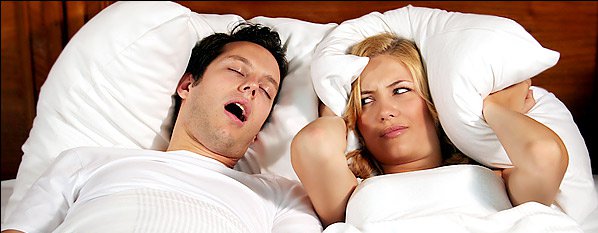[vc_row alt_color=”” alt_bg_color=”” parallax=”” full_width=”” full_screen=”” background_overlay=”” mask=”” mask_style=”50″ vertical_align=”” padding_size=”” el_class=””][vc_column alt_color=”” alt_bg_color=”” text_align=”” padding_size=”” el_class=”” width=”1/1″][vc_column_text]
Laugh and the world laughs with you. Snore and you sleep alone.
Snoring is partially obstructed breathing. Some 76 million people in North America (U.S. and Canada) suffer from snoring. Snoring is frequently a person’s most socially disruptive and annoying personal trait. Recent research reveals that continuing throughout life as a snorer or a sleep apneic no longer is unavoidable, but rather is a personal choice – a decision by a specific person not to do anything about it.
- 60% of males and 40% of females over the age of 60 snore. (Female snoring increases after menopause.)
- The loudness of snoring may reach as high as 90 db.
- (Worker’s compensation requires ear protection in the workplace at 90 db.) 98.5% of snorers exhibit some apneic tendencies.
Snoring can lead to sleep apnea because it can change tissue structure. In recent clinical studies, dentists and physicians have found that, in the majority of patients, a well-made, well-fitted dental appliance will effectively reduce or eliminate snoring.
Most sleep researchers agree that the position of the tongue during sleep is a substantial causative factor in both snoring and sleep apnea. As a person goes to sleep, especially while lying on his or her back, the muscles of the tongue and jaw relax and these structures move backward against the posterior wall of the throat. As the airway becomes partially blocked, snoring occurs . If it progresses to complete airway blockage, sleep apnea (multiple stoppages of breathing for 10 seconds or longer) occurs . The tongue is attached to the lower jaw. By moving the lower jaw forward with a nighttime dental appliance, the tongue is moved forward, the airway is opened up and stays opened, and snoring stops. The snoring stays stopped as long as the appliance is worn. Most severe snorers wear their appliances for the rest of their lives. The downside of the dental approach is that there is a two to three night adjustment period (as with any other item such as contact lenses) and possible sore teeth for a few nights if the snorer is a nighttime tooth grinder. Upon awakening, your bite may be different for approximately thirty minutes.[/vc_column_text][/vc_column][/vc_row]
